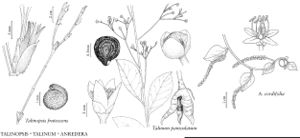Difference between revisions of "Talinum paniculatum"
Fruct. Sem. Pl. 2: 219. 1791.
FNA>Volume Importer |
FNA>Volume Importer |
||
| Line 35: | Line 35: | ||
}}<!-- | }}<!-- | ||
| − | --><span class="statement" id="st- | + | --><span class="statement" id="st-undefined" data-properties=""><b>Plants </b>to 15 dm. <b>Stems</b> sometimes reddish, slender. <b>Leaves</b> to 12 cm, reduced abruptly beneath inflorescence; blade elliptic to obovate, base attenuate. <b>Inflorescences</b> paniculate, sometimes nodding. <b>Flowers</b>: sepals deciduous, sometimes reflexed, ovate to suborbiculate, 2.5–4 mm; petals red or pink, sometimes orangish, yellowish, or purplish, ovate to suborbiculate, 3–6 mm; stamens ca. 15–20; stigmas 3, linear; pedicel terete, ± uniformly slender, to 20 mm. <b>Capsules</b> subglobose, sometimes obtusely trigonous, 3–5 mm, exocarp and endocarp usually separating after dehiscence; endocarp valves persistent, remaining connate at apex, attached to receptacle by vascular strands from capsule apex; exocarp dehiscing from apex, valves deciduous ± separately. <b>2n</b> = 24.</span><!-- |
-->{{Treatment/Body | -->{{Treatment/Body | ||
| + | |phenology=Flowering and fruiting Jun–Nov, year-round in s Fla. | ||
|habitat=Moist to dry woodlands and savannas, also desert scrub, grasslands, beaches, on flats, mounds, slopes, ledges, in sand, clay, limestone, sandstone, igneous, often rocky soils and crevices | |habitat=Moist to dry woodlands and savannas, also desert scrub, grasslands, beaches, on flats, mounds, slopes, ledges, in sand, clay, limestone, sandstone, igneous, often rocky soils and crevices | ||
|elevation=0-2200 m | |elevation=0-2200 m | ||
| Line 60: | Line 61: | ||
|basionyms=Portulaca paniculata | |basionyms=Portulaca paniculata | ||
|family=Portulacaceae | |family=Portulacaceae | ||
| + | |phenology=Flowering and fruiting Jun–Nov, year-round in s Fla. | ||
|habitat=Moist to dry woodlands and savannas, also desert scrub, grasslands, beaches, on flats, mounds, slopes, ledges, in sand, clay, limestone, sandstone, igneous, often rocky soils and crevices | |habitat=Moist to dry woodlands and savannas, also desert scrub, grasslands, beaches, on flats, mounds, slopes, ledges, in sand, clay, limestone, sandstone, igneous, often rocky soils and crevices | ||
|elevation=0-2200 m | |elevation=0-2200 m | ||
| Line 67: | Line 69: | ||
|publication year=1791 | |publication year=1791 | ||
|special status= | |special status= | ||
| − | |source xml=https://jpend@bitbucket.org/aafc-mbb/fna- | + | |source xml=https://jpend@bitbucket.org/aafc-mbb/fna-data-curation.git/src/9216fc802291cd3df363fd52122300479582ede7/coarse_grained_fna_xml/V4/V4_1027.xml |
|genus=Talinum | |genus=Talinum | ||
|species=Talinum paniculatum | |species=Talinum paniculatum | ||
| − | |||
| − | |||
| − | |||
| − | |||
| − | |||
| − | |||
| − | |||
| − | |||
| − | |||
| − | |||
| − | |||
| − | |||
| − | |||
| − | |||
| − | |||
| − | |||
| − | |||
| − | |||
| − | |||
| − | |||
| − | |||
| − | |||
| − | |||
| − | |||
| − | |||
| − | |||
| − | |||
| − | |||
| − | |||
| − | |||
| − | |||
}}<!-- | }}<!-- | ||
-->[[Category:Treatment]][[Category:Talinum]] | -->[[Category:Treatment]][[Category:Talinum]] | ||
Revision as of 13:56, 27 July 2019
Plants to 15 dm. Stems sometimes reddish, slender. Leaves to 12 cm, reduced abruptly beneath inflorescence; blade elliptic to obovate, base attenuate. Inflorescences paniculate, sometimes nodding. Flowers: sepals deciduous, sometimes reflexed, ovate to suborbiculate, 2.5–4 mm; petals red or pink, sometimes orangish, yellowish, or purplish, ovate to suborbiculate, 3–6 mm; stamens ca. 15–20; stigmas 3, linear; pedicel terete, ± uniformly slender, to 20 mm. Capsules subglobose, sometimes obtusely trigonous, 3–5 mm, exocarp and endocarp usually separating after dehiscence; endocarp valves persistent, remaining connate at apex, attached to receptacle by vascular strands from capsule apex; exocarp dehiscing from apex, valves deciduous ± separately. 2n = 24.
Phenology: Flowering and fruiting Jun–Nov, year-round in s Fla.
Habitat: Moist to dry woodlands and savannas, also desert scrub, grasslands, beaches, on flats, mounds, slopes, ledges, in sand, clay, limestone, sandstone, igneous, often rocky soils and crevices
Elevation: 0-2200 m
Distribution

Ariz., Fla., Ga., Ky., La., N.Mex., N.C., S.C., Tex., Mexico, West Indies, Central America, South America, introduced in s Africa and s Asia.
Discussion
Talinum paniculatum is generally thought to be native west of the Mississippi River and adventive eastward, where it often is weedy. In many herbaria, specimens of T. paniculatum are filed as T. patens. Talinum spathulatum (T. chrysanthum) sometimes is recognized separately, but the few differences are minor and inconsistent, and almost all degrees of intergradation occur over much of the range.
